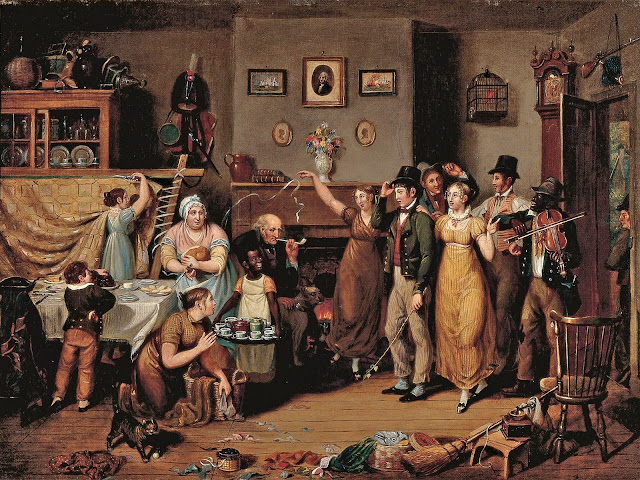John Lewis Krimmel (German-born American artist, 1786-1821) The first known image of a Christmas tree in America
John Lewis Krimmel was born in Ebingen, Wurtemberg, Germany, in 1787, and accidently drowned near Germantown, Pennsylvania, in July of 1821. He came to Philadelphia, where the Declaration of Independence had been debated & signed, in 1809, to engage in business with his brother but soon abandoned the business to concentrate on his art.
He began his art career painting portraits, but a copy of Wilkie's "Blind Fiddler" caught his attention; & he turned to humorous subjects and genre painting. Krimmel gathered information for his paintings in the American countryside around Philadelphia by observing local habits, rituals, & ceremonies, so even though he took most of his compositional formats from British prints made after paintings by the satirical artists William Hogarth & David Wilkie, his subject matter was familiar to his potential audience at the Pennsylvania Academy. He also painted more serious historical pictures, & at the time of his death he had received a commission to paint a large canvas on the landing of William Penn. Krimmel was president of the Society of American artists.
 John Lewis Krimmel (German-born American artist, 1786-1821) 4th of July 1819 in Philadelphia
John Lewis Krimmel (German-born American artist, 1786-1821) 4th of July 1819 in Philadelphia John Lewis Krimmel (German-born American artist, 1786-1821) Barroom Dancing 1820
John Lewis Krimmel (German-born American artist, 1786-1821) Barroom Dancing 1820 John Lewis Krimmel (German-born American artist, 1786-1821) Portrait of Jacob Ritter Sr.
John Lewis Krimmel (German-born American artist, 1786-1821) Portrait of Jacob Ritter Sr. John Lewis Krimmel (German-born American artist, 1786-1821) Black Sawyers Working in Front ot the Bank of Pennsylvania, Philadelphia
John Lewis Krimmel (German-born American artist, 1786-1821) Black Sawyers Working in Front ot the Bank of Pennsylvania, Philadelphia John Lewis Krimmel (German-born American artist, 1786-1821) Blind Man's Bluff
John Lewis Krimmel (German-born American artist, 1786-1821) Blind Man's Bluff John Lewis Krimmel (German-born American artist, 1786-1821) Country Wedding 1820
John Lewis Krimmel (German-born American artist, 1786-1821) Country Wedding 1820 John Lewis Krimmel (German-born American artist, 1786-1821) Fourth of July in Centre Square Philadelphia, 1812
John Lewis Krimmel (German-born American artist, 1786-1821) Fourth of July in Centre Square Philadelphia, 1812 John Lewis Krimmel (German-born American artist, 1786-1821) In an American Inn 1814
John Lewis Krimmel (German-born American artist, 1786-1821) In an American Inn 1814 John Lewis Krimmel (German-born American artist, 1786-1821) Members of the City Troup and other Philadelphia Soldiery
John Lewis Krimmel (German-born American artist, 1786-1821) Members of the City Troup and other Philadelphia Soldiery John Lewis Krimmel (German-born American artist, 1786-1821) Merrymaking at a Wayside Inn
John Lewis Krimmel (German-born American artist, 1786-1821) Merrymaking at a Wayside Inn John Lewis Krimmel (German-born American artist, 1786-1821) Nightlife in Philadelphia - An Oyster Barrow in front of the Chestnut Street Theater
John Lewis Krimmel (German-born American artist, 1786-1821) Nightlife in Philadelphia - An Oyster Barrow in front of the Chestnut Street Theater John Lewis Krimmel (German-born American artist, 1786-1821) Pepper-Pot Woman at the Philadelphia Market. 1811
John Lewis Krimmel (German-born American artist, 1786-1821) Pepper-Pot Woman at the Philadelphia Market. 1811 John Lewis Krimmel (German-born American artist, 1786-1821) Philadelphia Election Day 1815
John Lewis Krimmel (German-born American artist, 1786-1821) Philadelphia Election Day 1815 John Lewis Krimmel (German-born American artist, 1786-1821) Sunday Morning in front of the Arch Street Meeting House in Philadelphia
John Lewis Krimmel (German-born American artist, 1786-1821) Sunday Morning in front of the Arch Street Meeting House in Philadelphia John Lewis Krimmel (German-born American artist, 1786-1821) The Sleighing Frolic
John Lewis Krimmel (German-born American artist, 1786-1821) The Sleighing Frolic John Lewis Krimmel (German-born American artist, 1786-1821) Young Girl With A Blue Dress
John Lewis Krimmel (German-born American artist, 1786-1821) Young Girl With A Blue Dress John Lewis Krimmel (German-born American artist, 1786-1821) The VillageTavern
John Lewis Krimmel (German-born American artist, 1786-1821) The VillageTavern John Lewis Krimmel (German-born American artist, 1786-1821) Wordly Folk Questioning Chimney Sweeps and Their Master Before Christ Church in Philadelphia 1811-13
John Lewis Krimmel (German-born American artist, 1786-1821) Wordly Folk Questioning Chimney Sweeps and Their Master Before Christ Church in Philadelphia 1811-13 John Lewis Krimmel (German American arttist, 1786-1821) The Quilting Frolic 1813
John Lewis Krimmel (German American arttist, 1786-1821) The Quilting Frolic 1813%2Bknown%2Bimage%2Bof%2Ba%2BChristmas%2Btree%2Bin%2Bthe%2BUnited%2BStates.%2B%2Bkimmel.jpg)


















 er Gage (1808-1884), whose gravestone reads, "There is a word sweeter than Mother, Home or Heaven; that word is Liberty."
er Gage (1808-1884), whose gravestone reads, "There is a word sweeter than Mother, Home or Heaven; that word is Liberty."





+A+Liberated+Woman+1895.jpg)


